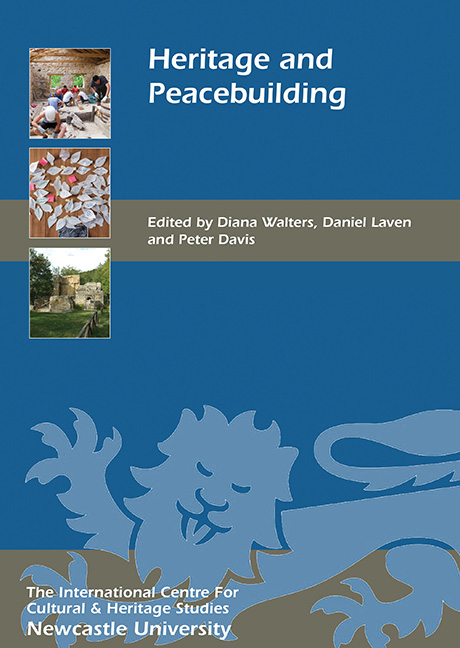Book contents
- Frontmatter
- Contents
- List of illustrations
- Acknowledgements
- List of abbreviations
- Preface
- Introduction
- NEW AND EMERGING IDEAS AROUND HERITAGE AND PEACE
- HERITAGE AND PEACEBUILDING IN PRACTICE
- 7 A Conversation with Sultan Somjee: Conflict and Peacebuilding in Kenya
- 8 Museum, Peace and Reconciliation: the Impact of the Balkan Museum Network
- 9 Diversity, Leadership and Peacebuilding in Museums in the Western Balkans
- 10 Disturbing the Peace: Museums, Democracy and Conflict Avoidance
- 11 Transforming Conflict Through Peace Cultures
- 12 Rethinking Heritage from Peace: Reflections from the Palestinian–Israeli Context
- 13 A Conversation with Will Glendinning: Diversity Challenges in Northern Ireland
- HERITAGE, PEACEBUILDING AND SITES
- List of Contributors
- Index
- Previous Titles
8 - Museum, Peace and Reconciliation: the Impact of the Balkan Museum Network
from HERITAGE AND PEACEBUILDING IN PRACTICE
Published online by Cambridge University Press: 16 February 2018
- Frontmatter
- Contents
- List of illustrations
- Acknowledgements
- List of abbreviations
- Preface
- Introduction
- NEW AND EMERGING IDEAS AROUND HERITAGE AND PEACE
- HERITAGE AND PEACEBUILDING IN PRACTICE
- 7 A Conversation with Sultan Somjee: Conflict and Peacebuilding in Kenya
- 8 Museum, Peace and Reconciliation: the Impact of the Balkan Museum Network
- 9 Diversity, Leadership and Peacebuilding in Museums in the Western Balkans
- 10 Disturbing the Peace: Museums, Democracy and Conflict Avoidance
- 11 Transforming Conflict Through Peace Cultures
- 12 Rethinking Heritage from Peace: Reflections from the Palestinian–Israeli Context
- 13 A Conversation with Will Glendinning: Diversity Challenges in Northern Ireland
- HERITAGE, PEACEBUILDING AND SITES
- List of Contributors
- Index
- Previous Titles
Summary
The Balkan Museum Network (BMN) is an independent, international, non-governmental organisation dedicated to safeguarding and promoting the tangible and intangible cultural heritage of the Balkans. It operates in a region that remains affected and burdened by its recent history of conflict, war and political dictatorship. In this challenging landscape the BMN was founded with the intention of contributing to the process of reconciliation, promoting dialogue and strengthening communication between museum professionals, and establishing new ways of sharing ideas between communities. In this chapter we explore how the BMN gathered museum professionals who were willing to participate in creating a better society using heritage assets, describe the contexts within which museums were working and explain how help from the international professional community was crucial for the establishment of the network. We describe the activities of the BMN that enabled this regional structure to develop into a wide platform for joint action and future plans and to build trust and develop cooperation. This chapter is written from the perspective of several members of the BMN and participants in the development of the network.
THE BALKAN CONTEXT
The turbulent times in the western Balkans in the 1990s led to the disintegration and end of Yugoslavia. The subsequent wars in the region, along with severe economic crises and in some countries hyperinflation, created a social setting of inequality, discrimination, social tension and low self-esteem, along with a sense of humiliation and a fragile accord between nations. Museums mirrored that situation and many of them fell into apathy (Bogoevski 2012, 26), wrestled with relative poverty (Šola 2011, 90) and generally had a marginal role in society. Old-fash- ioned museums struggled to maintain their audiences and their former prestigious positions (Dragićević-Šešić 1998, 69–70).
Immediately after World War II, with new socialist regimes in the western Balkans, museums were very important for the promotion of an official authorised history (Smith 2006, 4). They were developed in large numbers as the main channels for cultural and propaganda activities. Museums were considered to be ‘mighty instruments of the education of the people’ (Andrejević- Kun 1948, 2), patriotic institutions that were non-elitist but with the character of ‘a true peoples’ (social) institution offering real cultural development and, as scientific institutions, uncontested knowledge.
- Type
- Chapter
- Information
- Heritage and Peacebuilding , pp. 77 - 92Publisher: Boydell & BrewerPrint publication year: 2017



